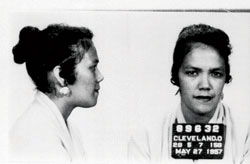Woman who won landmark Mapp case on exclusionary rule has died

AP Photo
A woman who challenged a warrantless search of her home, winning a landmark ruling on the exclusionary rule, has died.
Dollree “Dolly” Mapp was believed to be 90 or 91 when she died in Georgia on Oct. 31, the New York Times reports. “Even though Ms. Mapp’s name is etched in legal history,” the Times says, “she had lived quietly in recent years, and besides a brief notice on a funeral home website, it took more than a month for her death to be reported.” The Marshall Project also has an obituary.
Police searched Mapp’s suburban Cleveland home in 1957 in search of evidence that she or others living in her home were making a bomb and were involved in illegal gambling. Officers instead found books with sexually explicit pictures and charged Mapp with possession of obscene material. Mapp said the books belonged to a former boarder.
The trial court determined that police had no search warrant but convicted Mapp anyway. At the time, the exclusionary rule did not apply to the states. In Mapp v. Ohio, the U.S. Supreme Court ruled in 1961 that the rule was applicable to the states through the incorporation doctrine.
Mapp was previously married to a top-ranked fighter and was later engaged to a light-heavyweight champion whom she sued in 1956 for allegedly assaulting her and breaching his promise to marry her. The bombing that officers were investigating in 1957 had been at the home of Don King, who went on to become the famous boxing promoter.
Mapp later served time in a narcotics case; she alleged police had targeted her for the Supreme Court decision. Her sentence was commuted in 1980.
According to the Marshall Project, “Mapp’s life was as colorful and momentous as her death was quiet. She went from being a single teenage mother in Mississippi to associating with renowned boxers and racketeers in Cleveland to making her way in New York City, where she launched one business after another.” Some of the businesses “were legitimate, and some of them were whatever they were,” her niece told the Marshall Project.
Write a letter to the editor, share a story tip or update, or report an error.


